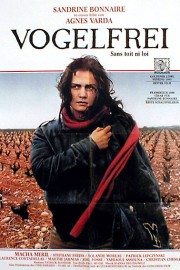Vagabond
“Vagabond” begins with a woman’s body in a ditch. It progresses through how that body ended up in the ditch. For most filmmakers, that would be the setup to a murder mystery, but Agnès Varda is more interested in exploring that woman’s life as a traveler, the people she meets, and the way she looks at life because of those experiences. We also see clips of the people she meets recalling her, reflecting on her from their own points of privilege. No, not all of them have glamorous lives, but all are able to survive by society’s rules while Mona isn’t.
Varda’s film is advocating for Mona (the titular vagabond, played by Sandrine Bonnaire) simply by showing us this story. She isn’t advocating for her lifestyle, but her existence as a human being. People like Mona are a mirror society holds up to us, challenging us to empathize with someone whom- on the surface- we would normally not sympathize with. We do not know why Mona is backpacking on her own, wearing the same smelly clothes day in and day out, and honestly, it’s none of our business. For Varda, the important thing for us to take away from her film is that this person exists, and how we view them says more about us than it does them. Mona is not based on a real person, but we’ve also seen people who’ve lived like her, for one reason or another. That is why Varda’s film has an impact.
Filming during the winter in France, it shows that the elements are against Mona, but we cannot blame the weather for how it impacts Mona- and no doubt accelerates her demise- because weather has no perspective, and Mona makes the choices she makes. There are times when she is offered the opportunity of work and shelter- for a time, at least- but for her, the life of a vagabond is where she is most comfortable. We see that she can be self-sufficient, even if just in the act of rolling her own cigarettes, but she lacks ambition for what society demands of people. One of the most pleasurable moments in the film is when she has taken up with a nurse for an elderly woman whose nephew is taking advantage of her. In the presence of Mona, the woman seems to be enjoying life for the first time in a while. But when the nurse sends Mona away before the nephew sees her- and the nephew sees his aunt laughing on her own- it gives him an opportunity to do what he’s wanted to do with her. We can’t get mad at Mona for making the woman laugh, though- she gave someone an opportunity to live their purest self, like she has been. It’s not her fault that society doesn’t see the value of people beyond a transactional one.
The way that Varda has the people who come into contact with Mona speaking, it’s like something out of a documentary. While the film is a work of fiction, there is an authenticity to the narrative that Varda achieves- in how she gets the performances she gets, in how she shoots the film- that feels like we are actually following a real person around, in the last weeks of her lives, and letting them show us how life is away from our cozy trappings. It’s a beautiful, haunting accomplishment.










